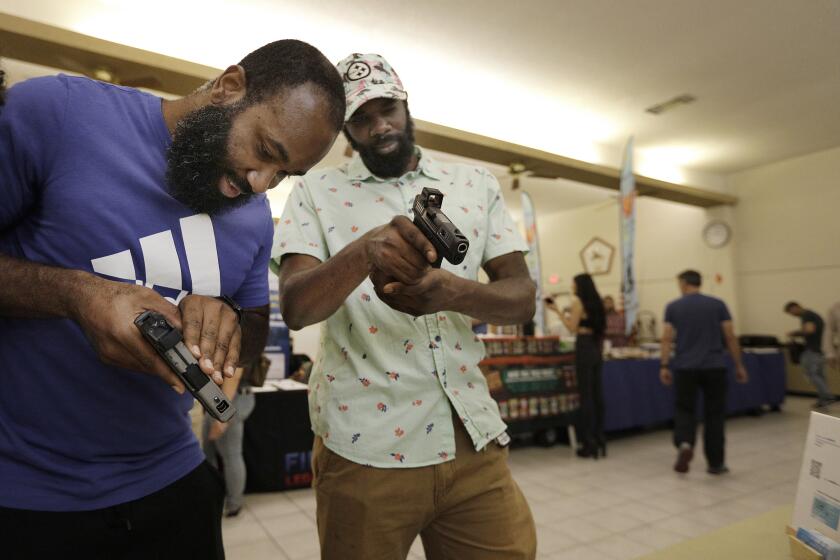Judge blocks California law targeting suppliers of ‘abnormally dangerous’ firearms

A federal judge has blocked enforcement of a California law allowing government officials and individuals to sue manufacturers and sellers of “abnormally dangerous” firearms.
Gun industry officials claimed Wednesday’s ruling as a victory in a growing national — and international — debate over who can be held liable for gun-related deaths. In recent years, liberal states like California — facing strong head winds to other gun control measures in federal courts — have sought new ways to combat mass shootings and other deadly gun violence.
U.S. District Judge Andrew G. Schopler found that the “abnormally dangerous” provisions of the state’s Firearm Industry Responsibility Act, which Gov. Gavin Newsom signed into law in 2022, probably violated constitutional law related to interstate commerce. He granted a preliminary injunction barring the state from enforcing those provisions while litigation proceeds, as requested by the industry group suing the state.
The law had defined “abnormally dangerous” weapons as having special features making them more suitable for “assaultive purposes” rather than recreation or self-defense. The law also targeted guns designed or marketed in ways that “foreseeably” promote illegal conversion into a fully automatic weapon, along with other products marketed to minors or other people prohibited from legally possessing firearms.
Schopler, an appointee of President Biden, denied the National Shooting Sports Foundation’s request to block other provisions of the law that require manufacturers and sellers to implement “reasonable controls” for gun safety and to avoid unfair business practices. Those portions of the law were left intact and remain enforceable.
The foundation, a gun industry trade association, filed its lawsuit before any of its members were sued under the law.
Daniel Villaseñor, a spokesman for Newsom, said the governor was reviewing the decision and considering potential “next steps” with California Atty. Gen. Rob Bonta.
“Importantly, the court dismissed the challenge to the law’s requirement that gun stores and others in the industry work to prevent unlawful transactions and other violations of law,” Villaseñor said. “This means bad actors can still be held accountable for harms their products cause.”
Larry Keane, the National Shooting Sports Foundation’s general counsel, said the gun industry was “very pleased” with the ruling. “It is certainly a win,” he said.
Newsom signed AB 1594 into law just weeks after the U.S. Supreme Court’s landmark ruling in New York State Rifle & Pistol Assn. vs. Bruen. That decision struck down strict state rules around concealed-carry permits and upended 2nd Amendment jurisprudence by declaring that gun laws can only be constitutional if they are deeply rooted in the nation’s history and tradition, or at least analogous to some historical law.
After the U.S. Supreme Court ruling on modern gun laws, California cited precedents involving enslaved people and other minorities in defending background checks.
Since then, federal judges applying the Bruen standard have struck down a host of gun laws, including California’s bans on assault-style weapons and high-capacity ammunition magazines. Those rulings are under appeal.
Schopler, however, did not rely on the Bruen decision in his ruling but rather the so-called dormant commerce clause of the Constitution, which is not part of the 2nd Amendment.
The Constitution generally gives Congress — not individual states — authority to regulate interstate commerce, Schopler wrote. California’s law was probably unconstitutional because it reached well beyond its borders, implicating manufacturers and sellers — like those represented by the National Shooting Sports Foundation — that make and sell firearms legally in other states, he wrote.
Schopler provided an example: A manufacturer makes an AR-style rifle legally in Tennessee and ships it legally to Arizona. A seller in that state makes a legal sale to a buyer. Hours later, a thief steals the gun, enters California and commits a crime there.
“Although the commercial transactions were conducted entirely out of state — and the lawful participants never set foot in California — the Tennessee manufacturer and Arizona retailer could both be sued under the ‘abnormally dangerous’ firearm provision,” Schopler wrote.
Keane applauded the judge’s analysis, saying California’s law violates the very “principles of federalism.”
“They are projecting their policy choices — through the threat of liability, through the threat of litigation — on commerce occurring entirely outside of the state,” the attorney said of California. “One state does not get to regulate lawful commerce occurring entirely outside of the state. Congress gets to regulate interstate commerce — not individual states.”
Keane noted that Schopler dismissed the foundation’s request for an injunction against the other provisions of the law, but said the group may refile its request if it found that those provisions are causing its members harm.
He said the group would consult its members before deciding its next steps.
More to Read
Sign up for Essential California
The most important California stories and recommendations in your inbox every morning.
You may occasionally receive promotional content from the Los Angeles Times.












